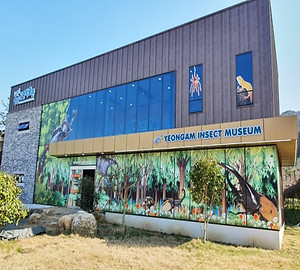
YEONGAM
Yeongam is a city and county in South Jeolla Province, South Korea. Bordered with Mokpo and Naju to the north, Jangheung County to the east, and Haenam and Gangjin to the south, Yeongam County comprises two eups and nine myeons, populated with about 57,000 people, and its county hall is seated in Yeongam-eup.

YEONGAMHO LAKE
This is a huge lake created when the Geumho tide embankment was constructed in Yeongam on November 1996, as part of a national project to reclaim some 4.3 kilometers stretch of sea from Sampo-ri in Samho-myeon of Yeongam-gun to Byeoram-ri in Hwawon-myeon of Haenam-gun. Some 100 species of migratory birds, numbering some 300,000, live in this area over the winter on the mud flats which are full of things to eat. Around the embankment where the sea water and fresh water meet, there is a great spot to fish for both fresh water and the sea species. This is perhaps the only place in Korea where the long and silvery cutlass fish, usually found in the deeper areas of the ocean, can be caught while sitting on the rocks along the seashore.
Address: Yongang-ri, Yeongam-gun, Jeollanam-do
TEL: +82-61-470-6071

YEONGAM GURIM HANOK VILLAGE
Nestled at the foot of Wolchulsan Mountain's western side in Yeongam-gun, Jeollanam-do, Yeongam Gurim Hanok Village has a 2,200 year-long history, stretching from the Three Han States to Proto Three Kingdom Period. The village is abundant with various historical stories and features, offering plenty of cultural tourism resources. The village includes 12 pavilions including Hoesajeong Pavilion and Gukamsa Shrine, traditional houses, stone walls, and old oak trees. Especially, 96 Korean-house accommodations including Anyongdang, Wolindang, Gukamsa, and Anhyeongung are located for tourists to stay in a traditional Hanok as well as to offer various traditional programs like paper craft, traditional wedding ceremony, rice cake-pounding, straw craft, catching fish, water activities and others. Also, Wangin Cherry Blossom Festival and Chrysanthemum Festival are held here every year.
Address: 43-14, Gurim-ro, Yeongam-gun, Jeollanam-do
TEL: +82-61-472-0939

YEONGAM POTTERY MUSEUM
Yeongam Pottery Museum is dedicated to promoting the history of pottery in Korea, starting from the oldest known pottery coming from Gurim Village. Visitors can learn about the history of this art form through exhibitions, educational programs, and hands-on experiences. Locally produced pottery is also available for sale. Nearby attractions include the Wangin Historic Site and Ha Jung-woong Museum of Art.
Address: 5, Seohojeong-gil, Yeongam-gun, Jeollanam-do
TEL: +82-61-470-6851
Website: dogi.yeongam.go.kr

YEONGAM WANGIN CULTURE FESTIVAL
Yeongam Wangin Culture Festival is held to commemorate the achievement of Korea’s Dr. Wangin, who traveled to Japan over 1,600 years ago to spread Korean knowledge, culture, and arts. Visitors can enjoy various events during the festival period.
Address: 440, Wangin-ro, Yeongam-gun, Jeollanam-do
TEL: +82-61-470-2346
Website: www.왕인문화축제.com

YEONGAM INSECT MUSEUM
Yeongam Insect Museum is located in Yeongam Gichan Land, Hoemun-ri, Yeongam-eup, Yeongam-gun, Jeollanam-do. This is a museum where children can see and experience insects and reptiles. It is a happy playground for children where education and play come together through friendly explanations and various experiences. The museum displays over 700 various specimens of insects from around the world. With explanations from the commentator, we can have fun learning about insects we didn't know about. The lawn in front of the museum has tools for children to play with, such as tuho, ring toss, and catch balls, making it suitable for families.
Address: 41 Gichanland-ro, Yeongam-eup, Yeongam-gun, Jeollanam-do
TEL: +82-507-1371-4300

WOLCHULSAN NATIONAL PARK CHEONHWANGSA TEMPLE AREA
Wolchulsan Mountain is a mountain-type national park at the southernmost tip of the Korean peninsula that, befitting its name of the mountain where the moon rises, combines beautiful natural scenery, cultural resources, and the local atmosphere of the South. Although it is a small area (56.220㎢) with many rocks and steep valleys, it is home to about 700 species of plants and 800 species of animals. Its conservation importance can be said to be very great due to its unique ecology that has adapted to the rocky terrain over a long period of time and its location where subtropical and temperate forests coexist. If you go up the hiking trail, you will find Cheonhwangsa Temple's outdoor sculpture park and campsite. The cool sound of water in Wolchulsan Cheonhwang Valley provides great visual and auditory comfort to hikers descending the mountain.
Address: 306 Dogapsa-ro, Gunseo-myeon, Yeongam-gun, Jeollanam-do
TEL: +82-61-473-5210
Website: https://www.knps.or.kr/
